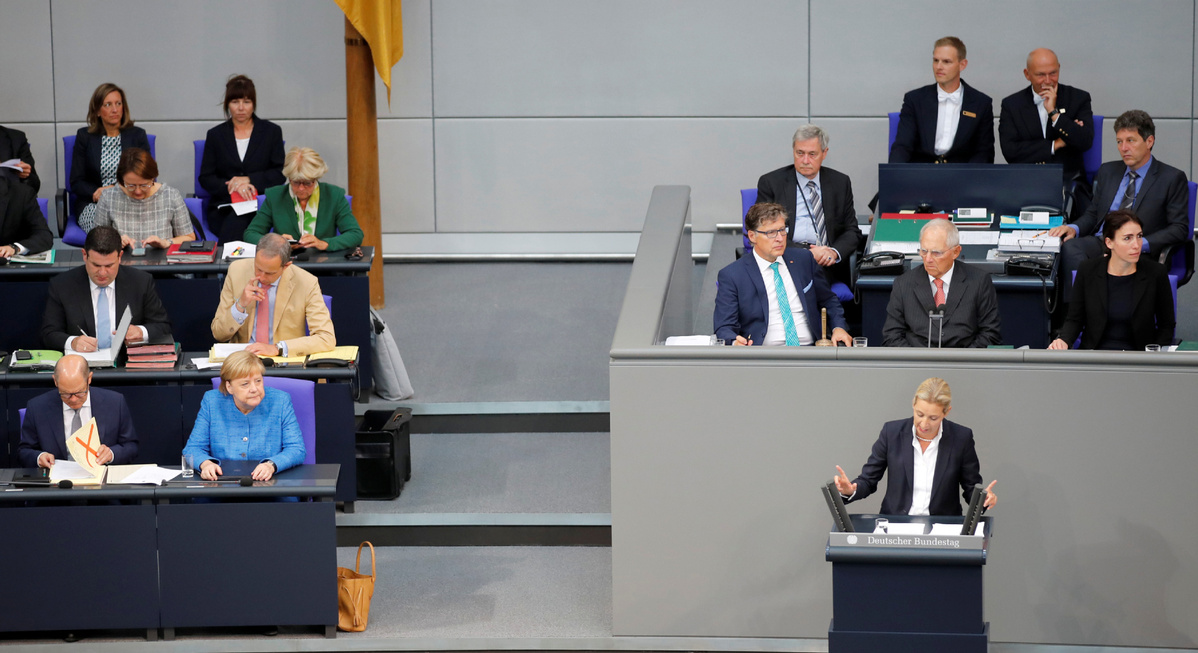Don't underestimate far right's surge, analysts say


The surge of Germany's far-right party Alternative for Germany, or AfD, in recent state elections signals that it will pose challenges for the mainstream political groups or even for the stability of the German coalition government, analysts said.
The AfD achieved a stunning second place earlier this month in two eastern state elections, taking 23.5 percent of the votes in Brandenburg and 27.5 percent in Saxony. That was an increase from 12.2 percent and 9.7 percent, respectively, five years ago.
Meanwhile, both German Chancellor Angela Merkel's Christian Democratic Union, or CDU, and the Social Democratic Party, or SPD, lost ground in the elections, compared with the 2014 results. However, the SPD maintained its first place in Brandenburg with 27.5 percent of the votes while the CDU still led in Saxony with 32 percent.
Cui Hongjian, director of the department for European studies at the China Institute of International Studies, said Germany's mainstream political groups have made a mistake underestimating the strength of the AfD since it was founded in 2013.
The party was first formed by a small group of euroskeptics who were critical of Germany's bailout of Greece after the global financial crisis. In the beginning, they just raised questions about the government but didn't have a clear political agenda.
"Chancellor Merkel carefully found a way of supporting the eurozone while convincing German people to accept that, so the AfD almost fizzled out as the crisis was successfully defused," Cui said. "The main political groups didn't expect it to develop into a strong force."
However, in 2015, the arrival of nearly a million asylum-seekers provided a great opportunity for the AfD. Anti-immigration then became its key policy and helped it grow rapidly.
In the last federal elections in October 2017, the AfD gained seats in every state parliament and became the third-largest party as well as the main opposition party facing Merkel's grand coalition.
He Yun, assistant professor at Hunan University's School of Public Management, said the AfD is part of the anti-establishment and anti-globalization movement that is sweeping many parts of the West right now.
"It took advantage of the refugee crisis and rose to power by stoking people's fear toward immigrants," she said. "Before the German federal government starting to allow refugees into Germany in 2015, all the far-right parties combined claimed less than 6 percent of voters in Germany, but after that their votes skyrocketed."
She said the AfD is good at using social media to spread its message directly to the public, which has proved to be "a very effective strategy in a digital age".
Cui said that even when the AfD entered the German parliament, however, many still believe its strength to be limited, as the mainstream parties have pledged not to collaborate with it.
"However, the election results in the eastern region remind people that the AfD has stable support in certain regions and from certain groups of people," he said.
Moreover, as Germany's economy is losing momentum, the AfD will have more chances to challenge the mainstream political groups and even the coalition government over various issues in the future, he added.
Germany's central bank, the Bundesbank, warned on Aug 19 that the country could enter a recession in the third quarter of this year, due to the falling industrial production and orders affected by the international trade tensions.
Though Germany has achieved great economic development in the past decade, there is still uneven development between the western and eastern parts of Germany. This is despite many measures the government has taken to stimulate the economic development in the eastern region, such as preferential policies and incentives for companies to invest there, Cui said.
"It is way too optimistic for the main political groups to think that the AfD will rest on the current achievements," he said.
Cui said if the CDU and the SPD cannot find solutions to their problems, then the political fragmentation in Germany might increase.
"There will even be a situation in which there are various political parties that are unable to reach a mainstream consensus, like the situation in some other European countries. That will have a great impact on the traditional stable political system of the country," he said.
He Yun of Hunan University expects that in the next federal election, both the AfD and the environmentalist Greens will take big chunks of votes away from the ruling CDU and SPD parties.
"It will be much harder for them to form a stable coalition afterward," she said, adding that drawn-out coalition talks and internal government rows will, in turn, be used by the AfD to show that the current system is not working and to further strengthen its position facing traditional parties.

































